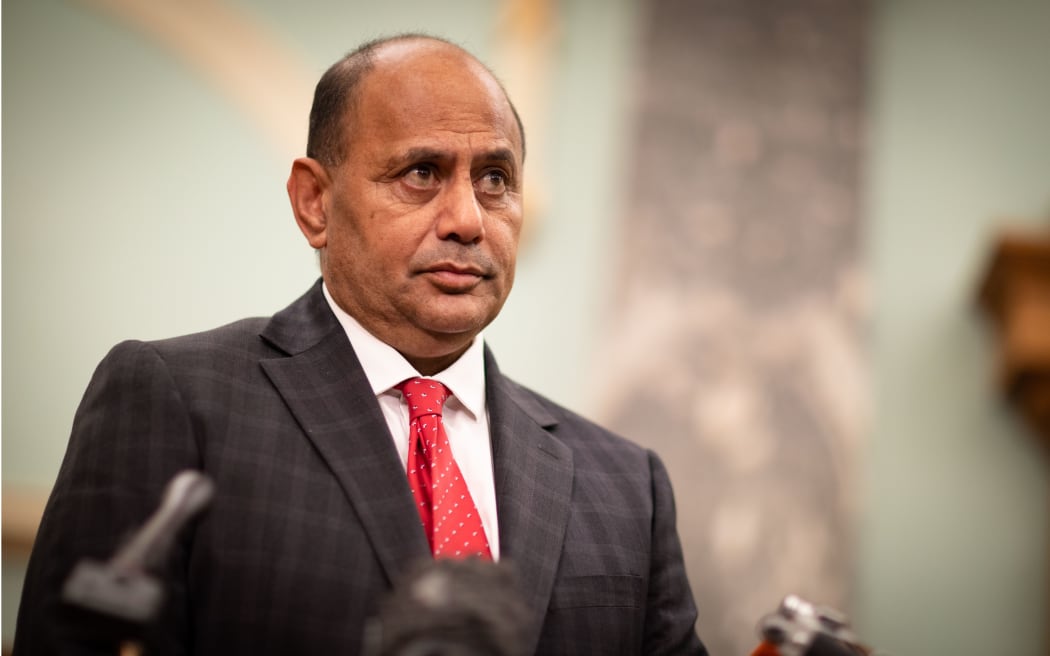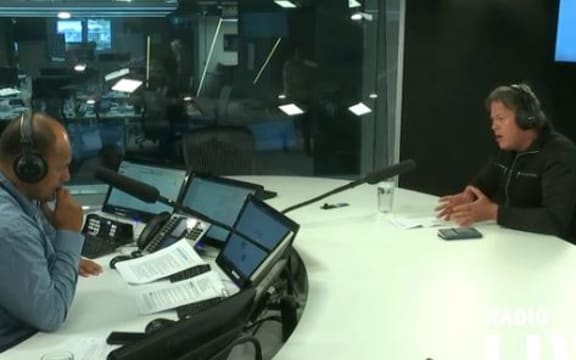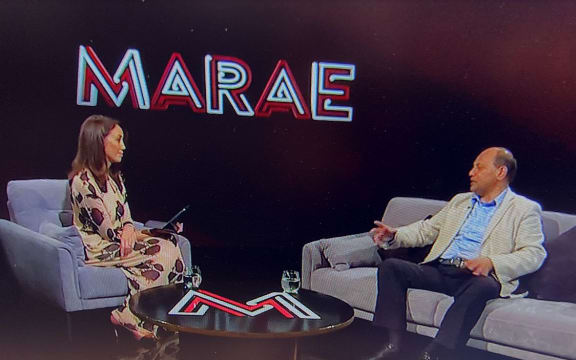Legislation to create a new public media entity entered Parliament this week. Mediawatch talks to the new broadcasting minister Willie Jackson about how that will work, the future of Māori media - and how he has given mainstream media a hard time as a broadcaster himself down the years.

Willie Jackson Photo: RNZ / Angus Dreaver
“I'm excited to introduce the Aotearoa New Zealand Public Media Bill today. The creation of this new entity will strengthen the delivery of public media services for future generations,” the recently-appointed Minister of Broadcasting and Media Willie Jackson told Parliament last Thursday.
If the bill passes, the government’s new public media entity will replace RNZ and TVNZ next year and the government’s already committed more than $300 million to part-fund it.
Why are they doing this?
While many nations have long-established joined-up public broadcasters offering a comprehensive service on radio, TV and online, New Zealanders have ended up with a small fully-publicly funded radio broadcaster in RNZ - and a publicly-owned but highly-commercial TV company in TVNZ.
Both make their own multimedia digital content and run their own online platforms for news, culture and entertainment.
Willie Jackson went on to tell Parliament the rise of online misinformation was another reason to boost public media to provide reliable accurate news.
But like other Labour-led interventions in broadcasting in this millennium, this one’s also being actively resisted by political rivals.
National MP Judith Collins told the House last Thursday mainstream media outlets themselves were responsible for a slump in public trust in news. She said social media platforms were providing much-needed alternative views.
Earlier, National’s broadcasting and media spokesperson Melissa Lee said the Public Interest Journalism Fund (PIJF) - the government initiative which put $55m over three years into a range of media outlets - had created “a perception that the government was giving media a kind of a bribe”.
“Media should not be trusted because they were literally being a mouthpiece for the government,” she said.
Collins and Lee are both members of Parliament’s Economic Development, Science and Innovation Committee which will scrutinise this bill.
(Incidentally, last week the committee also published the long-overdue report from its Inquiry into the Review of the Radio New Zealand Charter. It records National Party members of the committee feared the new public media entity may mean the “loss of the much-loved RNZ brand and character”.)
The new public media entity and the PIJF were both the work of previous broadcasting minister Kris Faafoi.
“I'm carrying on the work of Kris and ... I have always believed in the type of model that we're envisaging,” his successor Willie Jackson told Mediawatch this week.
“I know there are skeptics. I recently ran into a former broadcasting minister, who wasn't too optimistic in terms of the different drivers of non-commercial RNZ - and TVNZ as commercial. He said to me: ‘I don't think it’ll work.’
“But he also told me he believed in the principle. So I think you’ll need the right leadership and a cultural change,” Jackson told Mediawatch.
Long arm of political influence?
In Parliament last Thursday, Melissa Lee also claimed setting up Aotearoa New Zealand Public Media as an Autonomous Crown Entity (ACE) made it vulnerable to ministerial influence and direction.
Media analyst and former editor Gavin Ellis shared similar concerns in his blog this week, noting ACEs “must have regard to government policy when directed by the responsible Minister”.
“While the new public media organisation will be protected against ministerial interference on matters relating to content and newsgathering, there are many ways to skin the cat,” Ellis wrote.
“Why was the new entity not designated an Independent Crown Entity which is generally independent of government policy?” he asked.
“You can't be doing that if you're putting a couple of hundred million a year into an entity,” Jackson told Mediawatch.
“Do you really think that the government will be managing interviews or trying to change stuff? He shouldn't worry about that. There will be no editorial stranglehold,” he added.
“We’re already covered in the Broadcasting Act in terms of editorial independence, and we will strengthen that up, no doubt, because editorial independence is everything,” Jackson said.
Gavin Ellis explained why he did not believe the bill guaranteed that in his weekly media commentary blog:
"Internal structures – which must address the cultural and funding process differences between commercial and non-commercial broadcasting – are apparently entirely in the hands of the Establishment Board as there is nothing in the Bill that mandates the unique internal structure that will be needed to satisfy both imperatives. Does Parliament have no view, for example, on whether news and current affairs should be structurally separated from a commercial enterprise, say as a separate subsidiary with its own statutory independence?"
“It's not going to be an easy road. We're not going to get every single thing right. But once you get your Board in place, they'll work it all out. It’s nonsense about us wanting to direct and manage everything,” Jackson said.
From Māori media leader and agitator - to Minister in charge
Over the years - on and off the air - Jackson has certainly clashed with a lot of people and agencies he will now have to get along with.
“I'm not going to change my style one little bit. My style is one of being clear and being upfront. And I like to be respectful, believe it or not, and conciliatory with people. But sometimes you have to go to war. Sometimes you have to challenge,” Jackson told Mediawatch.

Destiny Church leader Brian Tamaki talking to Willie Jackson on Radio Live. Photo: screenshot
Just five years ago he was still a daily talkback host at Mediaworks’ former talk network Radio Live. He survived a suspension in 2013 after a now-notorious interview with a young woman who had encountered the teenage sexual predators who called themselves The Roastbusters.
Earlier he hosted publicly-funded Māori issues show Eye to Eye for TVNZ, on which political discussions could get a bit eye-for-an-eye at times.
In a Manukau Courier column in 2012 - 'Pack it in Paul' - Willie Jackson called for Paul Holmes and other broadcasters to be axed because he said they had a “dark side, when it comes to Māori issues”.
In 2015 the Broadcasting Standards Authority upheld a complaint against Willie Jackson after he claimed on his Radio Waatea show Paakiwaha that journalists Mihingarangi Forbes and Annabelle Lee had leaked information about Māori TV.
Willie Jackson - also the chief executive of Waatea’s owner the MUMA - hit back by claiming “the BSA is less effective for addressing Māori issues”.
When RNZ ended its contract for Radio Waatea’s news bulletins in 2011 - citing budget cuts and the desire to build its own Māori news capability - Willie Jackson called RNZ “a disgrace”.
“They were only interested in investing the hundreds of millions of dollars that flowed into their organisation ... and the crumbs that were left were given to news providers like Waatea,” he complained.
Five years later, Willie Jackson said RNZ had “a colonialist BBC mind-set which discriminates against Māori presenters”.
As chair of the iwi radio network group Te Whakaruruhau, he compiled an audit of RNZ output claiming Māori content only made up 1 percent of it.
It wasn’t a sound survey, only harvesting audio and news available online, but RNZ did accept it had little Māori journalism and few Māori staff.

Maori development minister Willie Jackson talking to TVNZ Marae host Miriama Kamo last weekend ahead of the Budget. Photo: TVNZ Marae
When RNZ followed up with a strategy signaling “a long term commitment to Māori news journalism and te reo,” Willie Jackson upped the pressure by urging the then-Broadcasting Minister Amy Adams to lean on the RNZ board to speed up the change.
“Back then I was an advocate - and you only get change if you challenge ministers or you change the government. I've been an advocate most of my working life, not just for Māori, but for working class people,” Jackson told Mediawatch.
“I didn't think I was going to be the Broadcasting Minister one day, and now I am ... I would welcome challenges to me.”
Willie Jackson was also chair of Te Putahi Paho representing stakeholders in Māori Television. In 2016, he was appointed to Te Matawai, the body that took over that responsibility to give iwi more say in Māori language initiatives.
At the time Labour MP Peeni Henare complained Willie Jackson’s roles in the media could create conflicts of interest.
“Tell Peeni to focus on his own job because many people want his seat,” Jackson told Māori TV.
One year later, they were both MPs in the Labour-led government.
That forced Willie Jackson to relinquish his Māori media roles, but not his opinions about Māori broadcasting.
As associate Māori development minister in 2018, Willie Jackson came out strongly against Larry Parr - chief executive of Te Mangai Paho - when he floated a ‘one-stop shop’ for Māori broadcast news.
That got awkward when a Māori media review fired up by Minister of Māori Development Nanaia Mahuta backed the idea of centralising Māori news production, training and funding.
But after the 2020 election, Willie Jackson became the minister himself - and he scrapped his predecessor’s plan and started again.
Budget 2022 last month included a further $40m for Māori media on top of a similar boost last year even though that strategic review of Māori media still hasn’t seen the light of day yet.
“It's all done. And it's in front of officials right now and you'll get it before the end of August,” Jackson told Mediawatch.
“You're right to point out it was started in 2018. But then ... the new minister had different ideas, as you well know,” he said.
“There is quite a shift and it that will be positive for mainstream media. We want to compliment all the good work that's happening in the mainstream,” he said.
Māori and mainstream converge?
In the past public broadcasters and Māori media have had parallel authority, funding, and accountability - in part to ensure Māori media remains independent and autonomous.
Now Willie Jackson’s portfolios mean he oversees funding of both at a pivotal time.
A Cabinet paper in 2020 stated the existing RNZ and TVNZ legislation “does not place sufficient emphasis on the Crown’s obligations to Māori”.
It called for legislation to set out the new entity’s “critical role in promoting Māori interests, mātauranga Māori and Māori culture, and protecting te reo Māori as a taonga”.
The ANZPM Bill states two members of its board must be Māori and have te ao Māori expertise. It also requires it to “ensure te reo Māori and tikanga Māori are valued, visible and flourishing”.
What difference will this make to ANZPM’s programmes and services?
“I don't want to ram Māori stuff down people's throats. I don't want everyone thinking you have to be fluent in Māori," he said.
While he said he cannot influence programming decisions at ANZPM, he hopes Māori representation in its governance will lead to more Māori content and issues on air.
His predecessor as broadcasting minister, Kris Faafoi extended public funding to a range of media companies that have not had public funding before via the $55m Public Interest Journalism Fund. The government has copped political blowback from people who think it has tried to buy compliance from the media.
The fund runs out in 2023. After that?
Willie Jackson told Mediawatch it is “not on the books at the moment”.
Does he believe - like Kris Faafoi - privately-owned media companies still need public funding for their journalism?
“I think if they're doing public interest journalism, I have no problem ... going down that track and I'm really pleased with how that fund’s gone. I don't think for one moment that [the recipients] are spokespeople for the government - that's just such a nonsense. I don't ask for any favours - just fairness,” he said.


